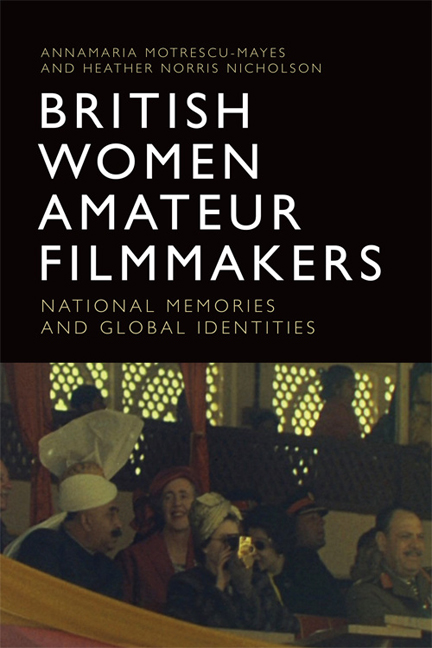Book contents
- Frontmatter
- Contents
- List of Figures
- List of Sources and Abbreviations
- Acknowledgements
- Foreword
- 1 Amateur Women Filmmakers as Producers of Cultural Meaning
- 2 Webs of Production and Practice
- 3 Resisting Colonial Gendering while Domesticating the Empire
- 4 Cameras Not Handbags: The Essential Accessory
- 5 Through Women's Lens: Imperial and Postcolonial Class and Gender Hierarchies
- 6 Teacher Filmmakers
- 7 British Women's Media Narratives of Gender and Collective Memory
- 8 Reimagining Boundaries: Amateur Animations
- Afterword
- Selected Bibliography
- Index
Afterword
Published online by Cambridge University Press: 12 November 2019
- Frontmatter
- Contents
- List of Figures
- List of Sources and Abbreviations
- Acknowledgements
- Foreword
- 1 Amateur Women Filmmakers as Producers of Cultural Meaning
- 2 Webs of Production and Practice
- 3 Resisting Colonial Gendering while Domesticating the Empire
- 4 Cameras Not Handbags: The Essential Accessory
- 5 Through Women's Lens: Imperial and Postcolonial Class and Gender Hierarchies
- 6 Teacher Filmmakers
- 7 British Women's Media Narratives of Gender and Collective Memory
- 8 Reimagining Boundaries: Amateur Animations
- Afterword
- Selected Bibliography
- Index
Summary
Presenting, analysing or comparing to amateur films made by over forty British women during most of the twentieth century remains nevertheless an initial survey of the vast and complex research sources and of their specific visual literacy. Their hobbyist practice was frequently an exercise in nuanced cultural and identity uphill battles, while creatively migrating from fixed, established social networks, and across personal rites of passage, towards self-empowering roles as producers of global culture. Whether teachers, homemakers, unmarried, middle or upper class, avid travellers or deeply anchored in remote communities, most British women who experimented with amateur filmmaking on film or video remain difficult to classify, both as psychological typologies and as women who chose to be behind a film camera in order to picture their identities in front of it – the images they filmed acting as their self-portraits. All done, fought for and expressed with polite and creative diligence in a ‘man's’ world and benefiting from a recently granted access to political entitlement. Importantly, their authorial and visual agency has translated more so than confirmed cultural assumptions about gender hierarchies and narratives. Many of their amateur films succeeded, directly or tangentially, voluntarily or accidentally, to break story-telling taboos and therefore the legacy of their diverse visual texts requires cross-disciplinary scrutiny. As they animated, recorded informally family scenes, and made documentaries, women amateur filmmakers were creating a corpus of visually mediated historical experience often against, or within, male-dominated master narratives. Patriarchal structures and assumptions shaped their everyday worlds for decades, even when they had agency and elements of autonomy within their personal lives. Today, their work, whether the simplest single cine reel with domestic scenes, or a carefully edited production, offers an uncharted theoretical territory. It was for these reasons that we chose to combine historical perspectives with experimenting with theories borrowed from visual and social anthropology, and with concepts such as autobiographical memory and the process of creating a storied self, when exploring some of the case studies discussed in this volume. Writing from complementary but contrasting perspectives, we hope that these women filmmakers’ practices open fresh routes to the interpretation of amateur cinema.
- Type
- Chapter
- Information
- British Women Amateur FilmmakersNational Memories and Global Identities, pp. 227 - 230Publisher: Edinburgh University PressPrint publication year: 2018



